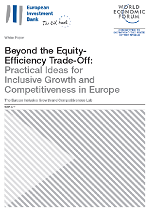Schoenmaker, Dirk, (2017), “A macro approach to international bank resolution”, Bruegel, 10 July As regulators rush to strengthen banking supervision and implement bank resolution regimes, a macro approach to resolution is needed that considers both the contagion effects of bail-in and the continuing need for a fiscal backstop to the financial system. This can be facilitated through the completion of a banking union in which the European Stability Mechanism (ESM) …Read More
We need a European Monetary Fund, but how should it work?
Sapir, Andre, Schoenmaker, Dirk, (2017), “We need a European Monetary Fund, but how should it work?”, Bruegel, 29 May Many voices are calling for the ESM to be developed into a fully-fledged European Monetary Fund. But what changes would this entail, and how could the new institution be governed? The authors see both need and hope for change. Relevant Posts Merler, Silvia,Schoenmaker, Dirk, Véron, Nicolas, (2017), «How will Europe’s banking …Read More
The Banking Union: An Overview and Open Issues
Schoenmaker, Dirk, (2017), “The Banking Union: An Overview and Open Issues”, Bruegel, 2 May The move to European Banking Union involving the supervision and resolution of banks at euro-area level was stimulated by the sovereign debt crisis in the euro area in 2012. However, the long-term objective of Banking Union is dealing with intensified cross-border banking. Relevant Posts Navaretti, Giorgio Barba, Calzolari, Giacomo, Pozzolo, Alberto Franco, (2016), “Sovereign and banking risk: Completing the union and breaking …Read More
The European Fund for Strategic Investments as a New Type of Budgetary Instrument
Rinaldi, David, Núñez Ferrer, Jorge, (2017), “The European Fund for Strategic Investments as a New Type of Budgetary Instrument”, CEPS Research Report No 2017/07, 5 April This paper provides an overview of the European Fund for Strategic Investments (EFSI) as a budgetary instrument. A preliminary analysis of the quantitative impact of its first year and a half of activity is complemented by an outline of the corollary policies that can …Read More
Financial Transactions Taxes Make the Economy More Efficient
Baker, Dean, (2017), “Financial Transactions Taxes Make the Economy More Efficient”, CEPR, 3 April The government of Belgium is arguing that trades by these funds should not be subject to the tax. This objection makes little sense if the goal of the Belgium government is actually to protect the pension funds. Of course it is a great line of argument if the point is to sabotage the FTT while appearing to …Read More
Beyond the Equity- Efficiency Trade-Off: Practical Ideas for Inclusive Growth and Competitiveness in Europe
The Europe Inclusive Growth and Competitiveness Lab, (2017), “Beyond the Equity- Efficiency Trade-Off: Practical Ideas for Inclusive Growth and Competitiveness in Europe”, European Investment Bank, World Economic Forum, March The European Investment Bank (EIB) and World Economic Forum have issued a call to action for social inclusion to be put at the heart of EU economic policy. It comes as a new joint White Paper by both organizations, with contributions from …Read More
Guidance to banks on non-performing loans
ECB Banking Supervision, (2017), “Guidance to banks on non-performing loans”, ECB, March A number of banks in Member States across the Euro area are currently experiencing high levels of non-performing loans (NPLs). There is broad consensus on the view that high NPL levels ultimately have a negative impact on bank lending to the economy1 , as a result of the balance sheet, profitability, and capital constraints faced by banks with …Read More
The Case for Fiscal Policy to Support Structural Reforms
Banerji, Angana, Dabla-Norris, Era, Duval, Romain, Furceri, Davide, (2017), “The Case for Fiscal Policy to Support Structural Reforms”,IMF, 13 March Many advanced countries need structural reforms to make their economies more productive and raise long-term living standards. Our new research shows that provided countries can afford it, fiscal policy, through spending or tax incentives, can help governments overcome some obstacles to the reforms, particularly in the early stages. Structural reforms …Read More
European identity and the economic crisis
Merler, Silvia, (2017), “European identity and the economic crisis”, Bruegel, 6 March Ferrera looks into what it means to be a European, and argues that integration proceeded so as to favour the emergence of a pan-European elite identity, while the inherited weight and inertia of national cultural frameworks prevented the emergence of a deeper sense of common citizenship across the EU. The ‘econo-cracy’ and austerity politics of the recent crisis years …Read More
GDP-linked bonds: A primer
Cecchetti, Stephen, Schoenholtzm Kim, (2017), “GDP-linked bonds: A primer “, VoxEu, 1 March Policymakers and economists have been looking for ways to make it easier to manage increasing debt burdens. This column assesses one possible solution: GDP-linked bonds that tie the size of debt payments to an economy’s wellbeing. There are clear benefits to a government from issuing GDP-linked bonds, but establishing investor confidence in these instruments will require a …Read More





